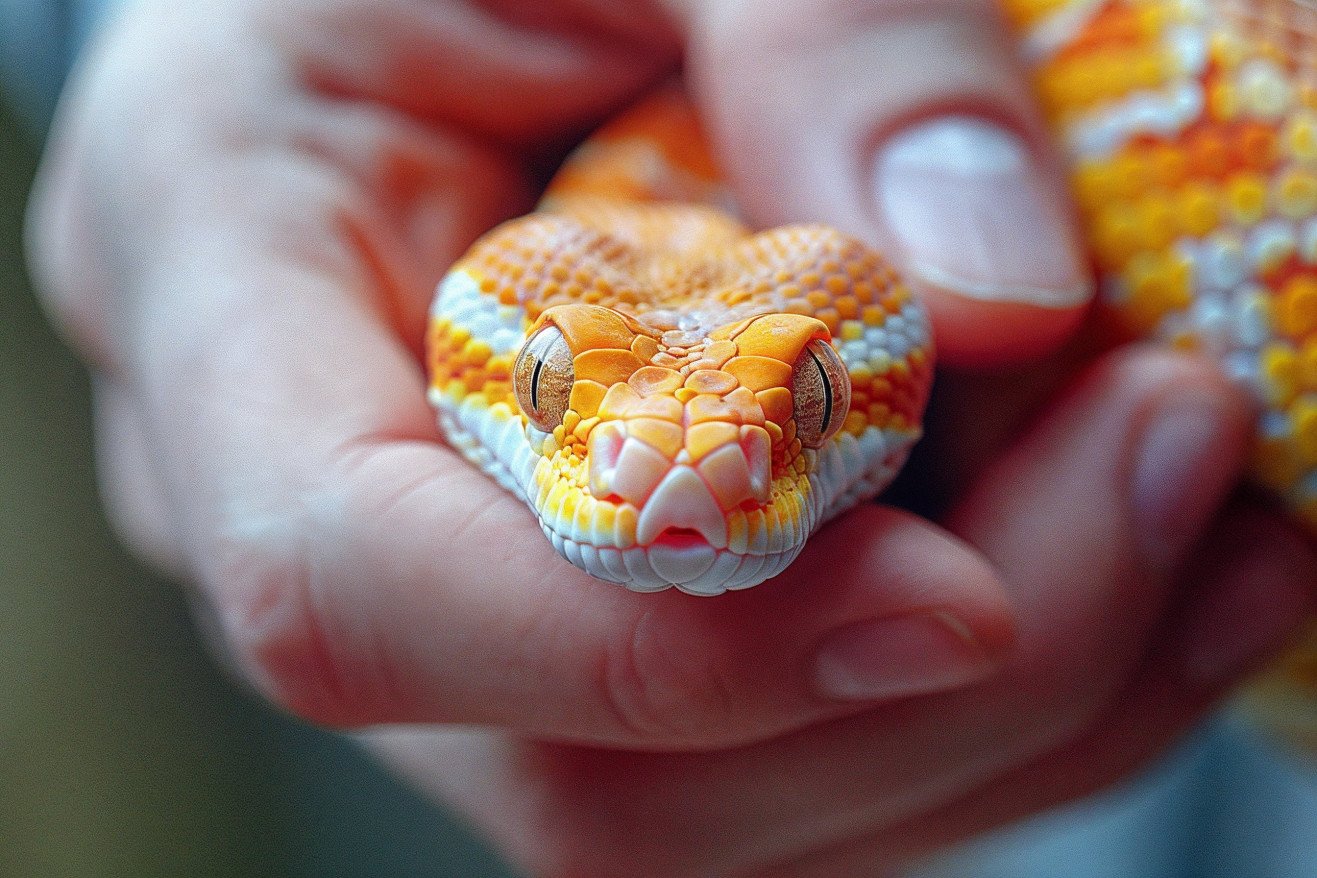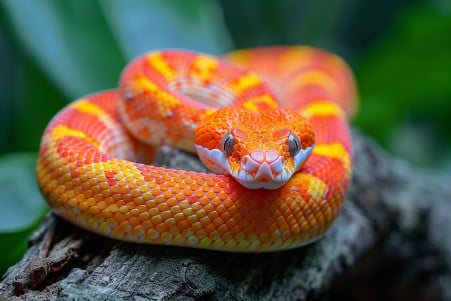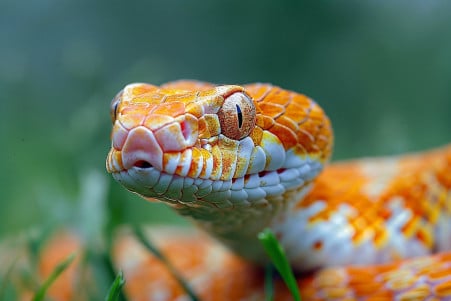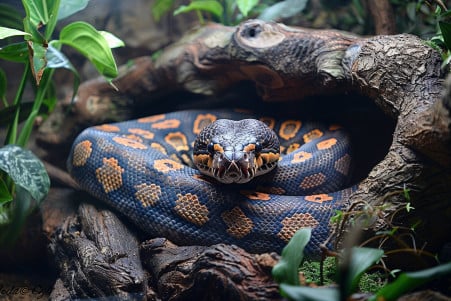Do Corn Snakes Bite? How to Avoid Getting Bitten by Your Pet
7 May 2024 • Updated 7 May 2024

If you're thinking about getting a corn snake but are worried about the possibility of getting bitten, you're not alone. Although corn snakes are generally very friendly, they may bite if they feel threatened or if they mistake your hand for food. That said, their bites are usually harmless and there are a few things you can do to reduce the likelihood of getting bitten. Because of their manageable size and gentle nature, corn snakes are a great option for both first-time and seasoned snake owners.
To make sure you have a positive experience with your corn snake, we'll take a look at why corn snakes bite and then offer some evidence-based suggestions and tips from snake handlers to help you avoid getting bitten. This information will enable you to better understand your snake's needs and behavior and set up an environment that will help you avoid bites and strikes. By the time you're done, you'll feel confident that you can build a trusting relationship with your new scaly friend.
Do corn snakes bite?
Corn Snake Temperament and Bite Risks
Corn snakes are popular pets due to their friendly and easy-going nature. While they may bite or strike if they are surprised, if they are shedding and their vision is temporarily impaired, or if they are very hungry, these are rare occurrences. As a defense mechanism, corn snakes will often vibrate their tail when they feel threatened.
With that said, if they are handled regularly and properly, corn snakes can be tamed and friendly pets that are good with people. In fact, PetMD explains that most corn snakes are tolerant of handling and will even come to their owners during their active periods if they feel secure in their environment. By learning about their general lack of aggression and the circumstances that can lead to biting, pet owners can manage their expectations and learn how to avoid surprising their pet snake.
Safe Handling Techniques to Prevent Bites
Safe handling is the most important way to prevent corn snake bites. According to PetMD, this means that owners should approach the snake slowly and calmly, making sure not to make any sudden movements that could scare the snake. In addition, the Petco Corn Snake Care Sheet warns against handling the snake while it's shedding or immediately after, as this can cause a lot of stress and lead to biting.
Proper body support is also important when handling corn snakes. According to The Spruce Pets, this means that owners should avoid grabbing or holding the snake too tightly. Instead, they should make sure to support the snake's entire body. Making sure the snake is well-fed is also important, as Zen Habitats notes that snakes are more likely to bite if they're hungry and mistake a hand for food.
It's also important to make sure that you're handling the snake regularly and giving it time to get used to human interaction. If you do this, you can help ensure that your snake is in a safe, low-stress environment and that it's less likely to exhibit defensive biting.
How to Treat Corn Snake Bites
If you are bitten by a corn snake, it is important to stay calm and avoid jerking or pulling away, as this can cause more damage. PetMD explains that the first thing you should do is gently remove the snake and then clean the bite area thoroughly with soap and water. Apply pressure to stop any bleeding and go to the doctor if the bite is deep or does not stop bleeding.
Keep an eye on the bite area for any signs of infection, such as redness, swelling, or pus, and see a doctor if you notice anything concerning. My Family Vets also notes that it is important to take your snake to the vet as soon as possible so that any health issues can be diagnosed and treated. Finally, consider what led to the bite and adjust your handling methods to avoid future bites.
Although corn snake bites are usually harmless, knowing how to respond and what to do can help ensure that you and your snake stay safe and healthy.
Corn Snakes as Pets
Corn snakes are often cited as one of the best pet snake species for beginners. Per Terrarium Quest, they are easy to take care of and have uncomplicated housing and feeding needs. Corn snakes are also not aggressive and have a calm disposition, so they can be good pets for older kids. Their beautiful colors and patterns and their small size make them popular pets.
That said, potential owners need to be willing to feed them live or pre-killed mice and be willing to take care of them for the long haul. As mentioned by PetHelpful, corn snakes can live 15-20 years, so you have to be ready to care for them for a long time. If you're willing to put in the work, however, these fascinating animals can be great pets for beginners and experienced snake owners alike.
How to Monitor Corn Snake Health and Well-being
Corn snakes are prone to a variety of health problems, including mouth rot, mites, constipation, and respiratory infections. My Family Vets notes that symptoms of mouth rot (stomatitis) include swelling or color change in the mouth and gums, white frothy discharge, and frequent rubbing of the mouth. Mites, which suck the snake's blood, can be found around the eyes, mouth, and under the scales.
Owners should monitor their corn snake for signs of illness, including lethargy, loss of appetite, swelling, discharge, or difficulty breathing. PetMD explains that snakes that are sick will often be lethargic, have a decreased appetite, and may have a pink or reddish coloration to their skin.
Keeping detailed records of the snake's weight, feeding, behavior, and shedding can help catch potential health issues early, according to ReptiFiles. If any health issues are detected, it's important to seek veterinary care from a reptile expert as soon as possible.
In addition to veterinary care, maintaining a healthy corn snake also involves providing a suitable habitat, proper nutrition, and minimizing stress. With careful monitoring and regular care, corn snake owners can help ensure their pets remain healthy and happy.
Conclusion: How to Have a Good Relationship With Your Corn Snake
Corn snakes are often listed as one of the best snakes for first-time owners. The Spruce Pets explains that this is because they are relatively low-maintenance when it comes to their housing and dietary needs. They are also docile and not likely to bite, which makes them good pets for responsible kids. Their beautiful colors and patterns and their medium size make them an attractive option for a pet snake.
That said, potential owners should be ready to deal with feeding their corn snake live or pre-killed rodents and to take care of them for the long term. As explained by PetHelpful, corn snakes can live 15-20 years, so it's important that owners are willing to commit to their care for the long haul. However, with the right information and commitment, these beautiful reptiles can be a great pet for both first-time and experienced snake owners.


